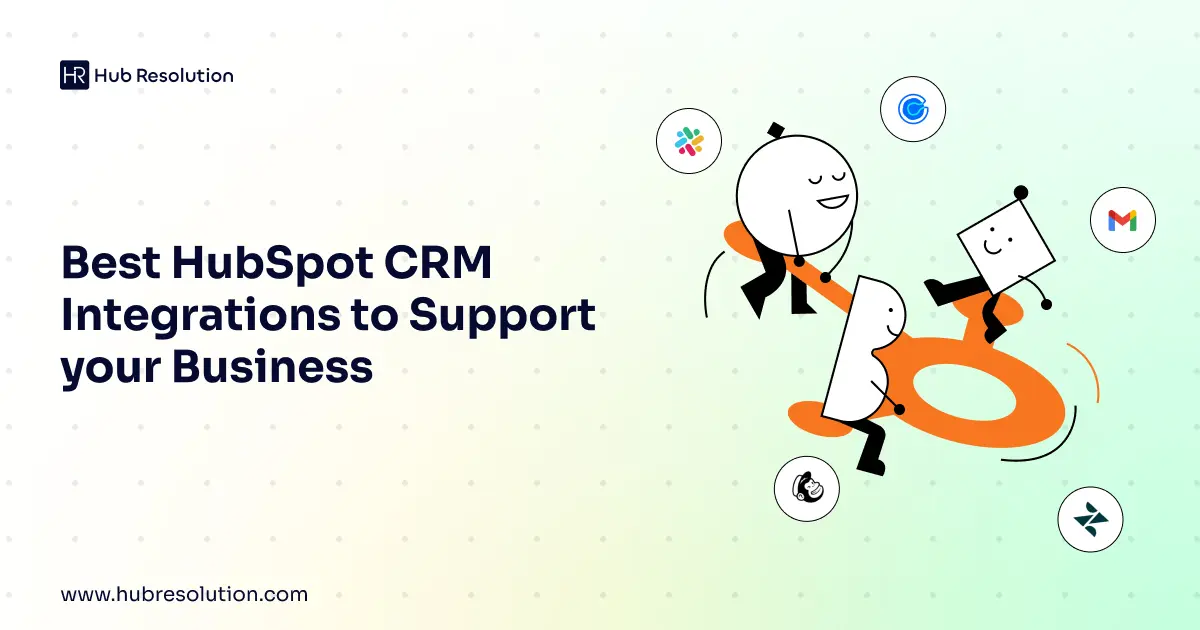In the world of customer relationship management (CRM), HubSpot stands out for its robustness, ease of use, and flexibility.
It is a powerhouse when it comes to managing your marketing, sales, and service activities all in one place. However, its real power is unleashed when you integrate it with other business tools.
Integrations can streamline processes, enhance customer understanding, and ultimately support your business goals. Below, we explore some of the best HubSpot CRM integrations that can provide comprehensive HubSpot support to your business.
CRM Integrations: Extending the Power of HubSpot
Integrating HubSpot with other tools can lead to greater insights, improved efficiency, and personalized customer experiences. Here are some top integrations that can help you leverage the full potential of HubSpot CRM.
1. Email Integration: Gmail & Outlook
Email remains a critical communication channel for businesses. Integrating your email service, like Gmail or Outlook, with HubSpot CRM can:
- Sync Emails: Automatically log emails as CRM activities.
- Track Interactions: Gain insights into which emails are being opened and clicked.
- Streamline Correspondence: Use templates and sequences right from your inbox.
2. Calendar Integration: Google Calendar & Outlook Calendar
Keeping your schedules aligned is crucial for any business. Calendar integration helps:
- Schedule Meetings: Easily book meetings without back-and-forth emails.
- Avoid Double Bookings: Sync calendars to reflect real-time availability.
- Automate Reminders: Set up reminders for upcoming tasks and events.
3. Social Media Integration: Facebook, LinkedIn, Twitter
Social media is a treasure trove of customer interaction data. Integrating these platforms with HubSpot enables you to
- Monitor Mentions: Keep track of when and where your brand is mentioned online.
- Publish Content: Schedule and publish content directly from HubSpot.
- Analyze Performance: See how your social campaigns are performing.
4. Customer Support: Zendesk & Help Scout
Providing excellent customer service is a key differentiator. Linking your support platform with HubSpot can:
- Centralize Information: Access customer support histories within CRM records.
- Create Support Tickets: Generate tickets from CRM contacts automatically.
- Align Teams: Ensure sales and support teams are on the same page.
5. E-commerce Integration: Shopify & WooCommerce
E-commerce businesses can greatly benefit from integrating their platforms with HubSpot for:
- Syncing Customer Data: Have a unified view of customer purchases and behaviors.
- Automated Marketing: Trigger email campaigns based on purchase history.
- Segmentation: Create detailed segments for targeted promotions.
6. Collaboration Tools: Slack & Microsoft Teams
Collaboration tools are the backbone of team coordination. Integrating them with HubSpot CRM allows for:
- Instant Notifications: Get CRM updates directly in your communication platform.
- Task Management: Assign and manage tasks without leaving your chat app.
- Streamlined Workflow: Share documents and collaborate on deals in real-time.
7. Accounting Software: QuickBooks & Xero
Financial insights are invaluable for making informed business decisions. Integrating your accounting software with HubSpot provides:
- Real-Time Data: View financial information alongside customer records.
- Invoicing: Generate and send invoices directly from the CRM.
- Revenue Tracking: Monitor customer payments and outstanding balances.
8. Project Management: Asana & Trello
Project management integrations ensure that your projects are in sync with your CRM activities:
- Project Alignment: Align sales and marketing projects with customer data.
- Task Automation: Automate task creation based on CRM triggers.
- Visibility: Gain insight into project status within the context of customer relationships.
9. Custom Integration: APIs & Webhooks
Sometimes, the best integration is a custom one. Using HubSpot’s APIs and webhooks, you can:
- Build Tailored Solutions: Create integrations specific to your business needs.
- Connect Unique Systems: Link systems that don't have out-of-the-box integrations.
- Automate Processes: Streamline unique processes via custom workflows.
Leveraging HubSpot Support for Integrations
To ensure these integrations work seamlessly and support your business effectively, you may need HubSpot support. Expert assistance can help you:
- Identify Key Integrations: Determine which HubSpot integrations will provide the most value based on your business model and goals.
- Ensure Smooth Implementation: Oversee the technical aspects of integration to ensure that data flows correctly and efficiently.
- Optimize Usage: Train your team on how to best use the integrated systems for maximum benefit.
- Provide Ongoing Support: Offer assistance for troubleshooting and updating integrations as needed.
Conclusion
HubSpot CRM’s potential is magnified when it's integrated with other tools and platforms that your business already uses. From email and calendars to e-commerce and project management, the right integrations can make your business more cohesive, data-driven, and customer-centric. And with expert HubSpot support, you can ensure that these integrations are implemented effectively, helping your business leverage the full power of HubSpot CRM.
Whether it's through improving customer interactions, streamlining internal processes, or gaining better insights, HubSpot integrations are an essential component of a successful business strategy.

